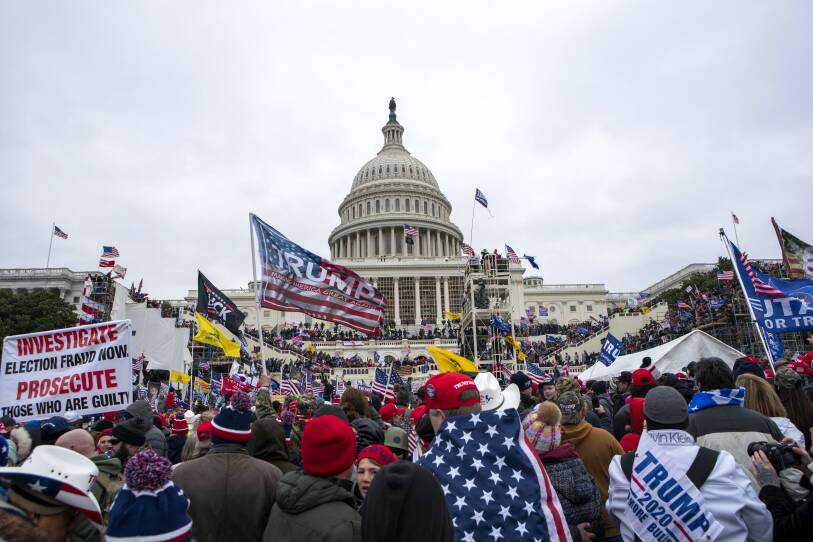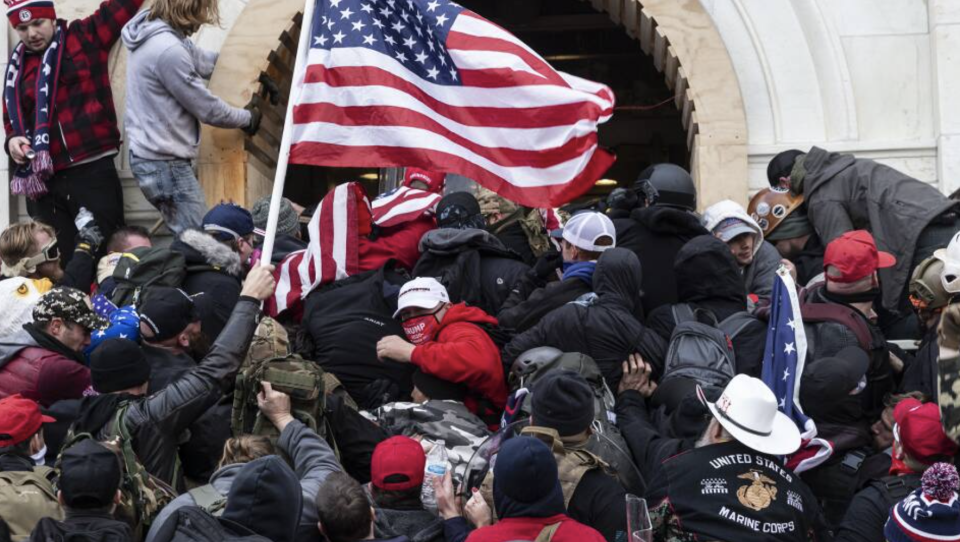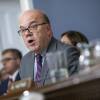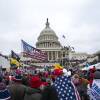Updated Jan. 6 at 5:02 p.m.
Days after a mob overran the U.S. Capitol a year ago in an attempt to prevent the certification of Joe Biden's election as president, Suzanne Ianni was handcuffed and led out of her home in Natick by members of the FBI's Joint Terrorism Task Force.
Ianni, 60 — a member of Natick’s Town Meeting — is one of six Massachusetts residents among more than 725 people that have been arrested and charged by the U.S. Justice Department nationwide with crimes connected with the attempt last year to overthrow the 2020 presidential election. Eleven defendants have been charged by the Boston Division of the FBI, which has jurisdiction over Massachusetts, Maine, New Hampshire and Rhode Island. Five other New Englanders have been arrested, indicted by a grand jury or charged by prosecutors.
Five people died as a result of the mob, including a U.S. Capitol Police officer.
One year later, GBH News looked at the Massachusetts residents who have been charged since that day, as well as the radiating effects of the insurrection in Massachusetts — reaching as far as its high school classrooms.
The defendants
Ianni was released without posting a bond. She is co-leader of a local right-wing organization called Super Happy Fun America. The group most famously organized the 2019 Straight Pride parade in Boston. Its vice president, Mark Sahady of Malden, was also arrested in connection with the riots in late January and is awaiting trial in Washington, D.C.
Ianni and Sahady were charged with “knowingly entering or remaining in any restricted building or grounds without lawful authority, and disorderly conduct in the U.S. Capitol grounds,” according to a Justice Department spokesman. Sahady pleaded not guilty on all counts.
More Local News
On Jan. 5, Ianni and Sahady organized several buses to transport Massachusetts and New Hampshire residents to the “Stop the Steal” protest preceding the insurrection and were photographed together inside the Capitol.
Their cases were moved to D.C. and are part of a long queue awaiting resolution in U.S. federal court. GBH News’ efforts to solicit comments from them and their lawyers were unsuccessful.
The most serious charges against Massachusetts participants in the Capitol riots were lodged against Troy Sargent of Pittsfield, who is accused of physically attacking police officers. Video taken at the scene and other evidence shared with the FBI appears to show Sargent throwing a punch at a police officer before retreating into the crowd. GBH News reached out to Sargent for comment but did not receive a reply.
The FBI last year also arrested Brian McCreary, 33, of North Adams for his role in the insurrection. McCreary has pleaded guilty to knowingly and unlawfully entering a restricted building, and was released without posting a bond while he awaits sentencing Jan. 14.
Kevin Allen Chase was arrested in June in Seekonk on charges including committing an act of physical violence on the Capitol grounds.
Also arrested in connection with the riot was a Somerville man, Noah Bacon, who was indicted on charges that include violent entry and disorderly conduct on Capitol grounds and obstruction of justice/Congress.
Bacon’s arrest followed a tip on Feb. 11 from someone who said they recognized him from a New Yorker Magazine photo documenting the mob action, confirmed by the FBI by checking the Massachusetts Registry of Motor Vehicles.
A seventh Massachusetts resident, David Lester Ross, 34, of Pittsfield, was charged with a misdemeanor for allegedly not heeding a District of Columbia curfew order on Jan. 6.

The aftermath
While some Republicans have described the legal actions against the rioters as “overreach,” Rahsaan Hall views the federal prosecutions as a necessary “deterrent to future insurrectionists and to hold to account those who were involved in the insurrection and the acts of Jan. 6.”
Hall, a former Suffolk County prosecutor in Boston who previously led ACLU Massachusetts’ racial equity program, said he was not surprised by the involvement of Massachusetts residents in the attack on the Capitol.
“This is a national phenomenon,” he told GBH News. “Let there be no mistake that what happened on Jan. 6 was as significant a threat to our democracy that we have ever seen, and it did not originate externally. As a nation, we must pay attention and begin to address right-wing white nationalism because it poses an existential threat to our existence.”
The involvement of local residents in the attack reflects widespread fears in the United States, according to Mark Bowden, the co-author of a new book about the events influencing the Jan. 6 insurrection called “The Steal.” Though the fears the spurred on the rioters aren’t unique to a single region, he said, many defendants share a common social trait.
“I haven’t seen a demographic breakdown, but I would argue that most of them probably come from rural areas, which tend to be white,” Bowden said. “Frankly, people who are never exposed in their daily life to people of different ethnicities, of different races and who I think are becoming increasingly fearful that the country is changing underneath them. And so you see genuine fear and genuine anger and that, you know, feeds these irrational suspicions.”
But data compiled by the Center for Rural Studies contradicts Bowden’s assertion, concluding that Jan. 6 insurgents are not more likely to be from rural areas. Rather, the authors found, they represent a broad cross section of white America from suburbs, major cities and small towns like North Adams, Natick and Pittsfield.
Hall agrees that racism was likely a key subtext of the attempt to overturn the election. “There were Confederate flags being flown through the halls of the Capitol — these relics of the time not in our too distant past of racial terrorism, were very present in this act on Jan. 6,” he said. “The fact that the African American vote was pivotal in the outcome of this election, the fact that the Latino vote and the votes of other naturalized citizens of color were critical in this election, says a lot about the desire to question the integrity of the vote.”
"Let there be no mistake that what happened on Jan. 6 was as significant a threat to our democracy that we have ever seen, and it did not originate externally."Rahsaan Hall, former Suffolk County prosecutor
For some of those who took part in the riot at the Capitol, there have been more than legal consequences.
Some of the defendants have lost jobs. Sahady and Ianni have argued that they are being persecuted for their conservative beliefs and for being Trump supporters. More than 1,700 Natick residents last year signed a petition calling for Ianni to step down or be dismissed from the Natick Town Meeting. Separately, members of that body voted 113 to 20 to condemn the riot. But Natick officials said they cannot legally remove Ianni from her position. Her term ends in March and she has yet to declare her intent to seek reelection to the 180-member board.
In August at an event at a sporting club in Auburn, Sahady and Ianni sought to parlay their infamy into fundraising for their legal expenses.
The Brookline-based nonprofit Facing History and Ourselves said the anniversary of the insurrection is an opportunity to engage students in wider discussions about democracy in America. It recently released a new curriculum to assist teachers in explaining the events of Jan. 6 and the larger social repercussions.
“We’ve kept our focus on how we support teachers and how we help them provide accurate and objective descriptions of events,” said Roger Brooks, the organization’s CEO and president. “The goal is: how do you help guide classroom reflection so teachers, with their students, can help piece together the story of what happened, separating some of the facts from the misinformation?”
But bringing Jan. 6 into the classroom is not without risks. A Natick High School teacher who incorporated the history of that day into his curriculum initially gave his name to GBH News for an interview, but then asked for anonymity because he fears being targeted by those in the area who supported the attempted overthrow of the election. He said his only interest is in teaching the truth of what happened that day.
“I want to lay out the facts, lay out what happened, let kids see actual footage,” he said, “and then solicit their interpretations of the events, and then also tie that into the importance of civic participation and in the role and the fragility of our democracy.”
Read on for a full list of Massachusetts residents charged in connection with entering the Capitol on Jan. 6, their charges and their case statuses:
Chase Kevin Allen, Seekonk
Charge(s):
Destruction or Injury to Buildings or Property in Special Maritime and Territorial Jurisdiction; Act of Physical Violence on Grounds
Case Status:
Arrested 6/30/2021
Suzanne Ianni, Natick
Charge(s):
Knowingly entering or remaining in any restricted building or grounds without lawful authority; Disorderly Conduct on Capitol Grounds
Case Status:
Arrested 1/19/2021. Initial appearance held 2/8/2021.
Charged via criminal information on 7/2/2021. Defendant remains on personal recognizance.
Brian McCreary, North Adams
Charge(s):
Obstruction of an Official Proceeding; Entering and Remaining in a Restricted Building or Grounds; Disorderly and Disruptive Conduct in a Restricted Building or Grounds; Disorderly Conduct in a Capitol Building; Parading, Demonstrating, or Picketing in a Capitol Building
Case Status:
Arrested 2/4/2021. Indicted 2/17/2021.
Arraigned 2/26/2021 where he pleaded not guilty to counts 1-5.
Plea agreement hearing held on 10/14/2021 where he pleaded guilty to count 2 of the indictment.
Defendant remains on personal recognizance. Sentencing set for 1/14/2022 at 9:40 a.m.

Noah S. Bacon, Somerville
Charge(s):
Knowingly Entering or Remaining in any Restricted Building or Grounds without Lawful Authority;Enter or Remain in the Gallery of either House of Congress; Disorderly Conduct in a Capitol Building; Violent Entry and Disorderly Conduct on Capitol Grounds; Obstruction of Justice/Congress
Case Status:
Arrested 6/30/2021. Indicted 7/23/2021.
Mark Sahady, Malden
Charge(s):
Entering or Remaining in Restricted Building or Grounds; Disorderly and Disruptive Conduct in a : Restricted Building or Grounds; Disorderly Conduct in a Capitol Building
Case Status:
Arrested on 1/19/2021 in Boston.
Criminal information issued 2/19/2021.
Sahady pleaded not guilty on all counts. Last status hearing was set for 10/5/2021 at 2:00 p.m.
Troy Sargent, Pittsfield
Charge(s):
Forcibly Assaulting, Resisting, Opposing, Impeding Federal Officers; Obstruction of Law Enforcement During Civil Disorder; Knowingly Entering or Remaining in any Restricted Building or Grounds Without Lawful Authority; Knowingly Engaging in Disorderly or Disruptive Conduct in Restricted Building or Grounds; Knowingly Engaging in Physical Violence in Restricted Building or Grounds; Willfully and Knowingly Engaging in Physical Violence in Capitol Grounds or Buildings
Case Status:
Arrested 3/09/2021. Indicted 3/26/2021.
Superseding indictment filed 11/10/2021.
Update: This story has been updated to correct the spelling of Suzanne Ianni's first name and add context to the assertion that Jan. 6 rioters were more likely to be from rural areas. An examination of the people charged contradicts that argument.








